
Sending I-Faxes
1
Place the original.
For more information, see "Placing Originals" in the User's Guide.
2
Press <Scan and Send>.
For more information, see "<Home> Screen" in the User's Guide.
3
Specify the destination on the Scan Basic Features screen.
For more information, see "Fax Basic Features Screen" in the User's Guide.
Specifying Destinations from the Address Book
Specifying Destinations from One-Touch Buttons
Entering Destinations Manually
Specifying Destinations in the LDAP Server

You can only change destinations from <Details> specified using the New Destination and destinations obtained via an LDAP server.
If the server machine is performing the System Manager information settings, authentication between the server machine and the client machine is performed while the client machine is obtaining the Remote Address Book/one-touch buttons. Authentication is performed by matching the System Manager ID and System Manager PIN set by the server machine and client machine. For more information, see "Changing the System Manager ID and PIN" in the User's Guide.
The availability of the Remote Address Book/one-touch buttons depends on the status of the System Manager information settings for the server machine and client machine, as shown below.
The availability of the Remote Address Book/one-touch buttons depends on the status of the System Manager information settings for the server machine and client machine, as shown below.
When the server machine is performing the System Manager information settings | When the client machine is performing the System Manager information settings | The System Manager ID and System PIN for the server machine and client machine match | Can use the Remote Address Book/One-Touch Button |
Performing | Performing | Matches | Yes |
Does Not Match | No | ||
Not Performing | - | No | |
Not Performing | Performing | - | Yes |
Not Performing | - | Yes |
Specifying Destinations from the Address Book
1
Press <Address Book>.
2
Select the destination and press <OK>.
If an access number is set when the destination is registered, press <Access No.> and enter the access number using the numeric keys. The corresponding destination is displayed in the Address Book.
To use the Remote Address Book, press <To Remote Address Book>. When <Change Address Book> is displayed, press <Change Address Book>  <Remote>.
<Remote>.
 <Remote>.
<Remote>.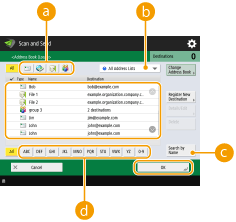
 Destination type buttons
Destination type buttonsPressing and
and displays I-fax and group destinations, respectively.
displays I-fax and group destinations, respectively.
 and
and displays I-fax and group destinations, respectively.
displays I-fax and group destinations, respectively. Drop-down list for selection of Address Book types
Drop-down list for selection of Address Book typesEnables you to display a specific group of destinations. When you are logged in to the machine with personal authentication management, selecting <Personal Address List> displays your personal Address Book.
 <Search by Name>
<Search by Name>Enables you to search the destination by the name you are entering.
 Search buttons by first letter
Search buttons by first letterEnables you to narrow down a search by the first letter of the destination name.
 |
To use the Remote Address Book, it is necessary to configure the server machine settings. Set to open the Remote Address Book externally on the server machine. |
Back to Top
Specifying Destinations from One-Touch Buttons
1
Press <One-Touch>.
2
Select the desired one-touch button and press <OK>.
To specify the destination using a one-touch button number (one-touch number), press  and enter the number for the desired one-touch button.
and enter the number for the desired one-touch button.
 and enter the number for the desired one-touch button.
and enter the number for the desired one-touch button.To use the Remote Address Book, press <To Remote Address Book>.
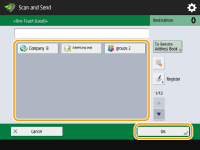
 |
The destinations registered in the one-touch buttons of the server machine are updated in the following times: When a fax job has been sent on the client machine When you press the Reset key on the client machine When Auto Reset is activated on the client machine |
Back to Top
Entering Destinations Manually
You can specify destinations manually that are not registered in the Address Book or one-touch buttons.
1
Press <New Destination>  <I-Fax>.
<I-Fax>.
 <I-Fax>.
<I-Fax>.2
Select the transmission mode.
If you want to set the machine so that you can check the sending result of a document on the <Status Monitor> screen, select <Full>. If not, select <Simple>. Note that the recipient also needs to support the transmission mode in order to check the sending result. Depending on the recipient's machine, sending an I-fax is not allowed unless you select <Simple>.
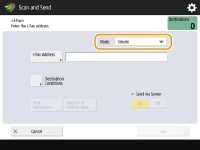

If you send an I-fax to a destination that does not support the transmission mode, the <Status Monitor> screen displays <Awaiting result...> even if sending is complete. This message is displayed until the time set for <Full Mode TX Timeout> passes. For more information, see "<Full Mode TX Timeout>" in the User's Guide.
3
Enter the I-fax destination.
Press <I-Fax Address>, enter the destination, and then press <OK>. The destination needs to be specified in a format such as "adv01@example.com." To send to a device within the same network, enter the destination in a format such as "adv01@192.168.11.100 (recipient's name@IP address)."
4
Press <Destination Conditions>.
5
Specify the receiving conditions the recipient supports and press <OK>.
Be sure to check the receiving functions the recipient supports before specifying the conditions.
To add another I-fax address, press <Next Destination> and repeat steps 2 through 5.
In <Compression Method>, the compression ratio of files increases in the order of MH→MR→MMR, and shortens transmission time.
In <Divide Data>, select <On> to divide large amounts of document data for sending. If the recipient does not have the function to combine divided data, select <Off>. For the <Off> setting, a transmission error occurs when the size of send data exceeds a certain value. For more information, see "<Maximum Data Size for Sending>" in the User's Guide.

Specifying the conditions the recipient does not support may cause a transmission error.

You can press <Register to Address Book> to register the entered destination. Set the required conditions, and specify <Name> and <Address Book>. For information on the settings, see "Registering Destinations in the Address Book" in the User's Guide.
6
Press <OK>.
 |
To send to a device within the same networkWhen sending an I-fax to a device within the same network, you can send directly to the device without going through the mail server. Set <Send via Server> to <Off> before sending an I-fax. |
Back to Top
Specifying Destinations in the LDAP Server
You can search and specify destinations registered in the LDAP server.
1
Press <Address Book>.
2
Press <To LDAP Server>.
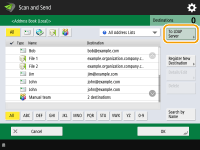
When <Change Address Book> is displayed, press <Change Address Book>  <LDAP Server>.
<LDAP Server>.
 <LDAP Server>.
<LDAP Server>.If the network password input screen is displayed, enter the user name and password and press <OK>.
3
Press <Search by Conditions>.
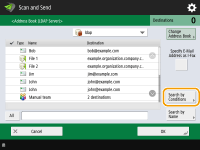
To display all the destinations in the LDAP server without specifying any conditions, proceed to step 5.
4
Specify the search conditions.
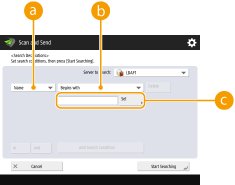
 Search categories
Search categoriesSelect a criterion to search for destinations from name, e-mail address, organization name, and organization unit (department name, etc).
 Search conditions
Search conditionsSelect a search condition such as a destination name that contains "John" and a department name that begins with "Development."
 Search characters
Search charactersPress <Set> and enter search characters for the search condition.

To search with multiple conditions
You can search destinations with multiple conditions. Specify the first search condition, press <Add Search Condition>, and then select <or> or <and> for the next condition.
5
Press <Start Searching>.
The search results are displayed.
To search with another condition, press <Delete> to delete the specified settings and then set a new condition.
6
Select destination and press <Specify E-Mail Address as I-Fax>  <OK>.
<OK>.
 <OK>.
<OK>.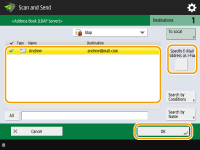
7
Check the displayed message and press <OK>.
8
Press <Details>.
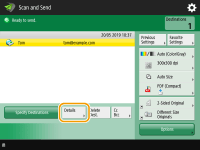
9
Specify the receiving conditions the recipient supports and press <OK>.
Press <Destination Conditions> and select the functions the recipient supports. Be sure to check the receiving functions the destination before specifying the conditions.
In <Compression Method>, the compression ratio of files increases in the order of MH→MR→MMR, so shortens transmission time.
In <Divide Data>, select <On> to divide send large amounts of document data for sending. If the recipient does not have the function to combine divided data, select <Off>. For the <Off> setting, a transmission error occurs when the size of send data exceeds a certain value. For more information, see "<Maximum Data Size for Sending>" in the User's Guide.

Specifying the conditions the recipient does not support may cause a transmission error.
10
Press <OK>.
Back to Top
4
Press <Options> and specify the scan settings as necessary.
For information related to this function, see the following in the User's Guide.
"Scanning Clearly"
"Scanning Efficiently"
"Useful Scanning Functions"
5
Press  .
.
 .
.Originals are scanned and sending starts.
To cancel scanning, press <Cancel> or 
 <Yes>.
<Yes>.

 <Yes>.
<Yes>. When <Press the [Start] key to scan the next original.> is displayed
When <Press the [Start] key to scan the next original.> is displayed
Place the next original to scan and press  . When scanning all of the originals is complete, press <Start Sending> to send the I-fax.
. When scanning all of the originals is complete, press <Start Sending> to send the I-fax.
 . When scanning all of the originals is complete, press <Start Sending> to send the I-fax.
. When scanning all of the originals is complete, press <Start Sending> to send the I-fax.To cancel sending, press <To Status Monitor>  select a document
select a document  <Cancel>
<Cancel>  <Yes>.
<Yes>.
 select a document
select a document  <Cancel>
<Cancel>  <Yes>.
<Yes>. |
To check the total number of specified destinationsThe total number of specified destinations is displayed on the top right of the screen. This enables you to confirm that the number of destinations is correct before sending. 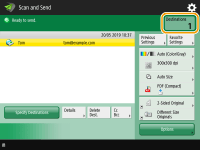 To send with the sender informationYou can send with the sender's name and I-fax address. For more information, see "<TX Terminal ID>" in the User's Guide. To check the statuses for sent documentsOn the <Status Monitor> screen, you can check the statuses for sent documents. This screen enables you to send faxes again or cancel sending after checking the statuses. For more information, see "Checking Status and Log for Sent and Received Documents" in the User's Guide. When <Display Notification When Job Is Accepted> is set to <On>, the <Status Monitor> screen can be displayed from the following screen that is shown after a send job is received. For more information, see "<Display Notification When Job Is Accepted>" in the User's Guide. 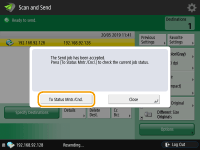 To print the report for the results of sendingOn the Scan Basic Features screen, pressing <Options>  <TX Report> enables you to set to automatically print the report listing the results of sending. For more information, see "Checking Status and Log for Sent and Received Documents" in the User's Guide. <TX Report> enables you to set to automatically print the report listing the results of sending. For more information, see "Checking Status and Log for Sent and Received Documents" in the User's Guide.To set this for each job from <Options>, it is necessary to select <For Error Only> or <Off> in "<TX Report>", and then set <Allow Printing from Options> to <On>. For more information, see "<TX Report>" in the User's Guide. To send files securelyUsing TLS communication enables you to send an encrypted file. For more information, see "Configuring the Key and Certificate for TLS" in the User's Guide. When multiple sheets are fedScanning is stopped and the message is displayed on the screen. Follow the instructions to clear the jam. When you have cleared the jam, the resume job screen is displayed. If the machine mistakenly detects multiple sheet feeding, press <Do Not Detect Multi. Sheet Feed> to resume scanning. To set the machine in advance to not notify you of multiple sheet feeding, perform one of the following operations. Each time you send, press <Options> on the Fax Basic Features screen  select <Detect Feeder Multi Sheet Fd.> to disable the setting. select <Detect Feeder Multi Sheet Fd.> to disable the setting. Set <Set Detection of Feeder Multi. Sheet Feed as Default> to <Off>. (For more information, see "<Set Detection of Feeder Multi. Sheet Feed as Default>" in the User's Guide.) When photos in the sent image are too dark or light colors in the background of color originals cannot be removedThe quality of the sent image may be able to be improved if the following conditions/settings are met. Job type: Fax (Memory Sending) or Scan and Send (Fax/I-fax) <Select Color>: <Black & White> (Scan and Send) <Original Type>: <Text> <Density>  <Background Density>: <Auto> <Background Density>: <Auto><Resolution>: 200 dpi x 400 dpi, 300 dpi x 300 dpi*, 400 dpi x 400 dpi, or 600 dpi x 600 dpi* *Can be set for Scan and Send <Speed/Image Quality Priority for B&W Scan>  Fax/I-Fax Send Jobs: <Quality Priority> (For more information, see "<Speed/Image Quality Priority for B&W Scan>" in the User's Guide.) Fax/I-Fax Send Jobs: <Quality Priority> (For more information, see "<Speed/Image Quality Priority for B&W Scan>" in the User's Guide.) |
TIPS |
Checking scanned images before sendingYou can check scanned images on the preview screen before sending. For more information, see "Checking Scanned Originals Before Sending/Saving (Preview)" in the User's Guide. Registering frequently used settingsYou can combine frequently used destinations and scan settings into a button of the machine for later use. By pressing the registered button when scanning originals, you can quickly complete your settings. For more information, see "Registering a Combination of Frequently Used Functions" in the User's Guide. |
For information related to this function, see the following in the User's Guide.
"Registering the LDAP Server"
"<Set Destination>"